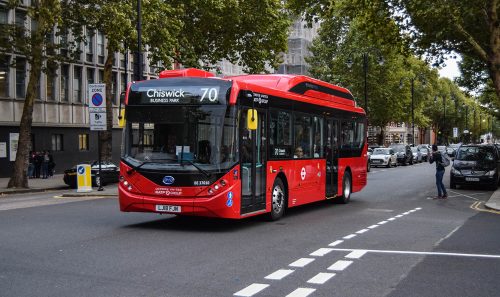Oxford Street pedestrianisation plans officially shelved, with the funds reallocated to the creation of new cycle superhighways
Transport for London (TfL) has released a five-year bu plan, the contents of which suggest that the end of Mayor Sadiq Khan’s fare freeze is near.
By 2023/24, the organisation is aiming to generate £6.6bn (64%) of its funding through passenger fares – up from a projected 2018/19 figure of £4.8bn (47%). This is despite the plan acknowledging that bus use in the capital is declining.
The plan ‘assumes’ that the Mayor’s fare freeze will continue until 2020, and that from January 2021 fares will rise by the rate of inflation plus 1%.

In order to meet the Mayor’s 2041 target of 80% of all journeys being made by sustainable methods, bus patronage will have to rise 40%.
To meet that target, TfL plans to:
• Introduce the Bus Safety Standard;
• ‘Reshape’ services in central and inner London to better match demand;
• Invest in bus priority initiatives;
• Improve customer information before and during journeys; and
• Ensure that the entire fleet meets Euro VI by 2020, and is zero-emission by 2037 (all new single-decker buses added to London’s fleet from 2020 will be zero-emission).
Bus drivers are also set to benefit from investment in toilet facilities, which will be delivered to 42 locations from April 2020.
TfL plans to install temporary facilities in the meantime to ensure drivers have access to new toilets as soon as possible.
TfL has also confirmed that its plans to pedestrianise Oxford Street have been officially dropped, after Westminster Council blocked the plans in April.
The £43m set aside to carry out the project has now been allocated to ‘healthy streets’ projects, including the creation of Chiswick’s CS9 cycle superhighway, the CS4 superhighway in Greenwich and the CS1 in Hackney.
To reduce its deficit, TfL plans to increase borrowing incrementally until 2022/23, topping out at £13.647bn – up from a forecast 2018/19 total of £11.267bn.
This will help fund a sharp increase in bus investment in 2021/22; net capital investment is expected to rise from £26m in 2020/21 to £47m.
The organisation expects to break even by 2022/23 – a year later than previously planned – due to the Crossrail delay and falling demand for public transport.

